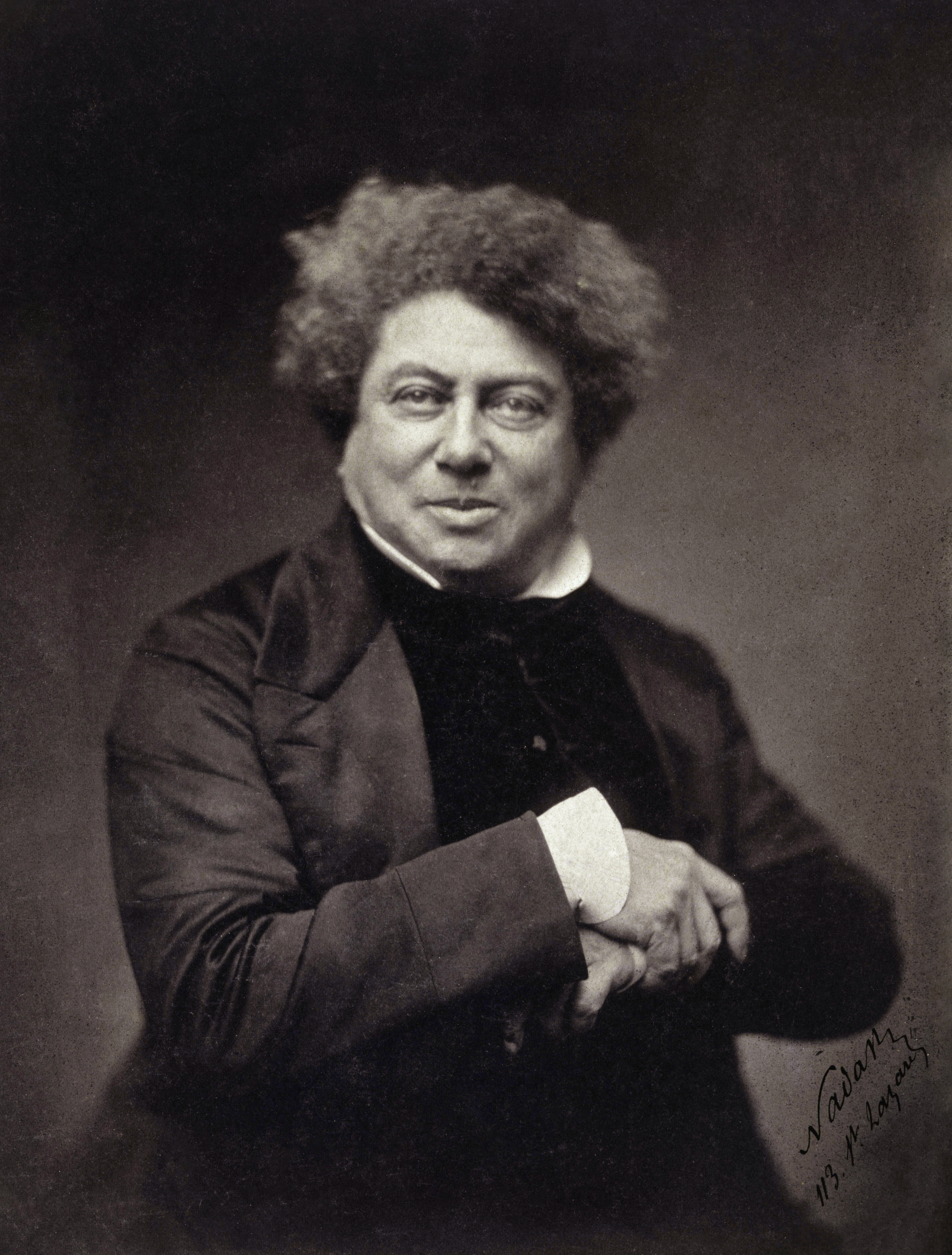Der Graf von Monte Christo
Alexandre Dumas d.Ä. Berühmte Zitate
„Alle für Einen, Einer für alle.“
Die drei Musketiere, Übersetzer: August Zoller, Verlag der Franckh'schen Buchhandlung, Stuttgart 1844, S.143, , siehe auch "Unus pro omnibus, omnes pro uno" bei Wikipedia
Original franz.: "Tous pour un, un pour tous." - Les Trois Mousquetaires, Éditeurs MM. Dufour et Mulat, Quai Malaquais 23, Paris 1849, S.80,
„Alle menschliche Weisheit liegt in den zwei Worten »Harren und Hoffen!«“
Der Graf von Monte Christo. Bearbeitet von Rose Gerlach. Verlag der Schiller-Buchhandlung. gutenberg.de http://gutenberg.spiegel.de/?id=5&xid=484&kapitel=45#gb_found
Alexandre Dumas d.Ä.: Zitate auf Englisch
“It is only the dead who do not return.”
Quelle: The Three Musketeers
“It is not the tree that forsakes the flower, but the flower that forsakes the tree.”
Quelle: The Count of Monte Cristo
Variante: As a general rule... people ask for advice only in order not to follow it; or if they do follow it, in order to have someone to blame for giving it.
Quelle: The Three Musketeers
“God is merciful to all, as he has been to you; he is first a father, then a judge.”
Variante: God is full of mercy for everyone, as He has been towards you. He is a father before He is a judge.
Quelle: The Count of Monte Cristo
“…… When one loves, one is only too ready to believe one's love returned.”
Quelle: CliffsNotes on Dumas's The Three Musketeers
Variante: Often we pass beside happiness without seeing it, without looking at it, or even if we have seen and looked at it, without recognizing it.
Quelle: The Count of Monte Cristo
Athos, Ch. 48: A Family Affair.
The Three Musketeers (1844)
“Weep," said Athos, "weep, heart full of love, youth, and life! Alas, would I could weep like you!”
Quelle: The Three Musketeers (1844), Ch. 63: The Drop of Water.
Le Vicomte de Bragelonne ou Dix ans plus (The Vicomte de Bragelonne) (1847)
“There is a woman in every case; as soon as they bring me a report, I say, 'Look for the woman.”
Il y a une femme dans toutes les affaires; aussitôt qu'on me fait un rapport, je dis: «Cherchez la femme!»
[Dumas, Alexandre, Alexandre Dumas, père, Théâtre complet, http://www.archive.org/details/thtrecomplet24dumauoft, 2009-08-07, XXIV, 1889, Michel Lévy frères, éditeurs, Paris, French, 103], translation from The Penguin Dictionary of Quotations II.iii
See wikipedia cherchez la femme on how this phrase has come to be used.
Compare Juvenal satire VI.243 (circa 100 AD), "never yet was there a lawsuit which did not have a woman at the bottom of it" (translation by G. G. Ramsay), but in that case describing the litigiousness of Roman women.
Les Mohicans de Paris (The Mohicans of Paris) (1864 play)
Chapter 11 http://en.wikisource.org/wiki/The_Count_of_Monte_Cristo/Chapter_11.
The Count of Monte Cristo (1845–1846)
Chapter 17 http://en.wikisource.org/wiki/The_Count_of_Monte_Cristo/Chapter_17
The Count of Monte Cristo (1845–1846)
Le Vicomte de Bragelonne ou Dix ans plus (The Vicomte de Bragelonne) (1847)
Chapter 2 http://en.wikisource.org/wiki/The_Count_of_Monte_Cristo/Chapter_2
The Count of Monte Cristo (1845–1846)
“The chains of wedlock are so heavy that it takes two to carry them; sometimes three.”
Les chaînes du mariage sont si lourdes qu'il faut être deux pour les porter; quelquefois trois.
Attributed to Dumas in: Elizabeth Abbott, Une histoire des maîtresses http://books.google.gr/books?id=fEsPUICzDY4C&dq=, Les Éditions Fides, 2004, p. 16.
Attributed
“Nothing succeeds like success.”
Rien ne réussit comme le succès.
Ange Pitou, Vol. 1 chapter 7 http://www.dumaspere.com/pages/biblio/chapitre.php?lid=r3&cid=7 (1854).
“Private misfortunes must never induce us to neglect public affairs.”
chapter 5 http://en.wikisource.org/wiki/The_Count_of_Monte_Cristo/Chapter_5
The Count of Monte Cristo (1845–1846)
